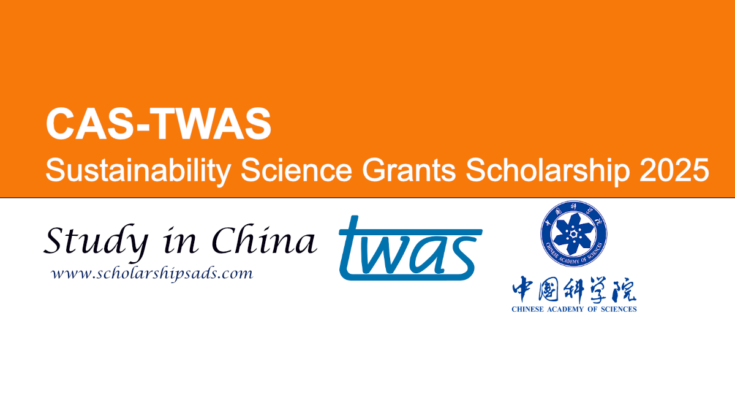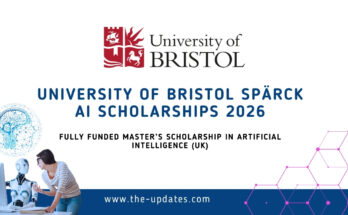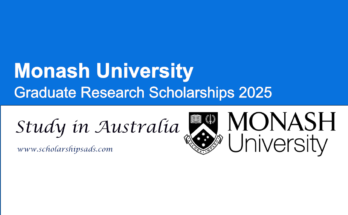12 May 2025
 CAS-TWAS China Sustainability Science Grants Scholarships.
CAS-TWAS China Sustainability Science Grants Scholarships.Description
The CAS-TWAS Sustainability Science Grants 2025 are now open for applications, offering up to RMB 600,000 in funding for collaborative research projects that support the United Nations Sustainable Development Goals (SDGs). This program is made possible through a partnership between the Chinese Academy of Sciences (CAS) and the TWAS Network for Sustainable Development.
What is the CAS-TWAS Sustainability Grant?
The grant promotes international collaboration between TWAS Members or TWAS Young Affiliates and CAS-TWAS Centres of Excellence (CoEs). Selected projects will run for two years, with a total budget of RMB 600,000 per project (RMB 300,000 annually). The initiative primarily supports in-person collaboration, including research visits, student exchanges, and workshops, while also allocating up to 30% of the budget for equipment or consumables.
Degree Level
CAS-TWAS China Sustainability Science Grants Scholarship 2025 is available to undertake Masters, PhD level programs at The World Academy of Science (TWAS).
Available Subjects
Fields of Research and Participating Centres of Excellence
CAS-TWAS Centre of Excellence for Green Technology (CEGT)
- Research Focus: Mechanism and technology for efficient and selective CO₂ transformation
- Contact: Dr. Wang Gang – wanggang@ipe.ac.cn
CAS-TWAS Centre of Excellence for Biotechnology (CoEBio)
- Research Focus: Bio-utilization mechanisms and key technologies for renewable energy
- Contact: Ms. He Liu – coebio@im.ac.cn / hel@im.ac.cn
CAS-TWAS Centre of Excellence for Climate and Environment Sciences (ICCES)
- Research Focus: Predicting climate extremes and their impacts using innovative techniques for disaster preparedness and sustainable development
- Contact: Ms. Hao Bo – haobo@mail.iap.ac.cn
CAS-TWAS Centre of Excellence for Water and Environment (CEWE)
- Research Focus: Water and environmental issues in sustainable development
- Contact: Dr. Wang Yawei – wangyawei@rcees.ac.cn
CAS-TWAS Centre of Excellence for Emerging Infectious Disease (CEEID)
- Research Focus: Prevention and control of tropical infectious diseases and pandemic potential pathogens
- Contact: Dr. Ma Sufang – masf@im.ac.cn
CAS-TWAS Centre of Excellence for Space Technology for Disaster Mitigation (SDIM)
- Research Focus: Climate-driven flood hazard modeling and critical infrastructure exposure analysis
- Contact: Dr. Wang Lei – sdim@radi.ac.cn
Benefits
Funding Breakdown
- Total Grant Per Project: RMB 600,000 (~USD 83,000)
- Project Duration: 2 years (RMB 300,000 per year)
- Eligible Costs:
- Travel and accommodation for collaborative visits
- Researcher/student exchange programs
- Workshop participation at CoEs
- Up to 30% may be used for equipment and consumables
Eligible Nationalities
Open to applicants of all nationalities residing outside China.
Eligibility Criteria
Who Can Apply?
- Must be a TWAS Member or TWAS Young Affiliate
- The lead applicant must not be based in China
- Projects must involve direct collaboration with one of the listed CAS-TWAS Centres of Excellence
- There is no age limit
- Projects must align with the Sustainable Development Goals (SDGs)
Application Procedure
Step 1: Pre-Application (Deadline: 14 June 2025)
- Identify a relevant CoE based on your research focus.
- Send your CV and research proposal to the contact person of that CoE.
- If accepted, you and the CoE will jointly prepare a full application.
Step 2: Final Application (Deadline: 1 September 2025)
- Submit the completed application form to:
- programmes@twas.org
- dywang@cashq.ac.cn
- Application form available at twas.org
Selection Process
Each CoE will assess incoming proposals and select the most suitable collaborators. Final project funding will be managed by CAS and disbursed via the CoEs based on the approved budget and work plan.
At the end of the two-year project, both the CoE and the collaborating TWAS scientist(s) must submit a final report to TWAS and CAS.
Why Apply?
This is a high-impact funding opportunity for researchers committed to addressing global sustainability challenges through international cooperation. It is especially beneficial for scientists in the Global South looking to connect with top research institutions in China and contribute to SDG-focused outcomes.
Source link



